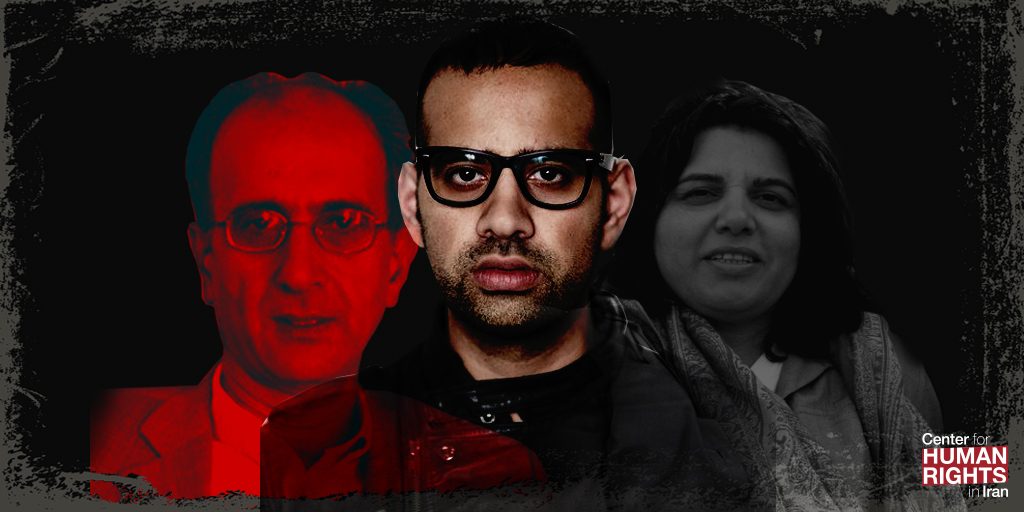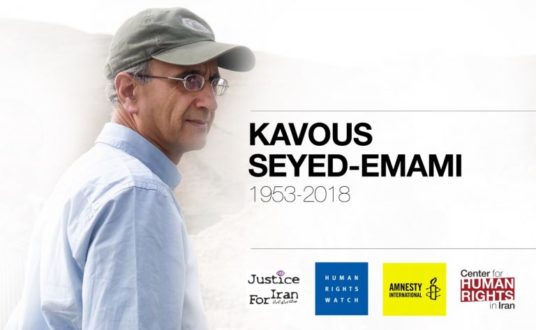CHRI – A man claiming to be a reporter in a pseudo-documentary about Iran’s detained conservationists that was aired by the state-controlled Islamic Republic of Iran Broadcasting (IRIB) organization on national television has been recognized as an interrogator by one of his victims.

Ramin Seyed-Emami—whose father Kavous Seyed-Emami, a sociologist and conservationist died under suspicious circumstances in Tehran’s Evin Prison in February 2018—notified the Center for Human Rights in Iran (CHRI) about the man’s background after IRIB partially aired the pseudo-documentary, titled “The Usual Suspects,” on November 10, 2019.
The program was abruptly halted two minutes after it was broadcast on IRIB’s Channel 3. The reason, according to the state broadcaster’s public relations office, was “technical issues” with a “high probability” that it would be shown the following night. As of the time of this writing, November 14, 2019, the program has not been aired again.
“One of the more than 30 Islamic Revolutionary Guard Corps’ agents who raided our home in Tehran in June 2018 … is now a ‘reporter’ on that IRIB program,” Seyed-Emami told CHRI.
“He interrogated my mother [Maryam Mombeini] in front of a camera in our house,” he added. “My mother recognized him as soon as the program started. He wanted my mother to say that my father was a spy.”
The man’s real name is unknown.
IRIB, Iran’s state-controlled TV and radio broadcasting agency, has a documented history of working with security and intelligence officials to extract “confessions” from detainees held on politically motivated charges as well as from their associates, especially their relatives.
The confessions are often elicited under physical and/or psychological torture and then aired on state TV to discredit detainees before the public and convict them. A bill currently held up in Iran’s Parliament aims to prohibit state TV from airing such footage.
The man recognized by Mombeini as her interrogator appears at one minute and three seconds into the program.
“I think the program was halted because there are some government officials who knew my father well and know that the allegations against the detainees are not true,” Seyed-Emami, who lives in Canada, told CHRI. “My father and the detained activists are victims of a power struggle inside the regime.”
“The fact that the IRIB has tried to show this program, just as the court is about to make a decision on the detained conservationists, shows that they want to prepare the public for the verdicts that are going to be announced against them,” he added.
Seyed-Emami continued: “They also want to justify my father’s death in prison by telling lies and accusing him of spying. But whatever they do, no matter how many films they make, they cannot whitewash his death. None of the people who knew my father believe any of these accusations and lies.”
For the past 22 months, since January 2018, Niloufar Bayani, Morad Tahbaz, Taher Ghadirian, Houman Jowkar, Sepideh Kashani, Amir Hossein Khaleghi, Sam Rajabi, and Abdolreza Kouhpayeh have been detained in Tehran’s Evin Prison without due process after being arrested by the intelligence organization of the Islamic Revolutionary Guard Corps (IRGC).
Their detentions, widely condemned by the UN and international conservation organizations, included months of denied and restricted access to counsel, solitary confinement, and secretive court proceedings in which the detainees were denied written copies of their indictments and in some cases not informed when court was in session.
In early November 2019, the conservationists, all former employees of the Persian Wildlife Heritage Foundation, learned that they had been charged with “cooperation with U.S. and Israeli enemy states against the Islamic Republic of Iran for the purpose of espionage for the CIA and Mossad.” Bayani and Tahbaz are facing the additional charge of “gaining income through illegitimate means.”
In mid-October 2019, the charge of “corruption on earth,” which can lead to the death penalty under Iranian law, was dropped against four of the detained conservationists following pressure on the prosecutor and presiding judge by Iran’s Supreme Leader Ali Khamenei.
Three major state agencies have declared that the detainees did not commit espionage. In addition to the Intelligence Ministry and the Department of Environment, the country’s highest national security-focused body, the Supreme National Security Council, has also refuted the IRGC’s allegation that the conservationists were engaged in spying.
Almost two years after he died while held for interrogations in Evin Prison, no one has been held accountable for the death of former detainee Kavous Seyed-Emami, an Iranian-Canadian dual citizen who was arrested along with his eight colleagues in late January 2018.
State agents pressured Seyed-Emami’s family to quickly bury him without an independent autopsy. The judiciary also banned his widow from leaving Iran to join her sons in Canada until October 2019, nearly two years after his death.
Less than a week after Kavous Seyed-Emami’s death, IRIB aired a film that accused him of espionage, prompting the family’s lawyers to issue a statement condemning the organization’s attempt to “undermine the reputation of this national treasure” and attempting to sue the organization.
The remaining living eight detainees are now awaiting verdicts in their cases at the Revolutionary Court in Tehran.
Typically well-staged productions, the confessions and pseudo “documentaries” produced by IRIB are used to defame dissidents, intellectuals, and other individuals whom the authorities wish to discredit, legitimize their prosecution, and amass public support for their sentences.
Four IRIB officials were named in the Seyed-Emami family’s lawsuit, including its director Abdol-Ali Aliaskari, who was appointed by the supreme leader.
Read this article in Persian.
 Shabtabnews In this dark night, I have lost my way – Arise from a corner, oh you the star of guidance.
Shabtabnews In this dark night, I have lost my way – Arise from a corner, oh you the star of guidance.



